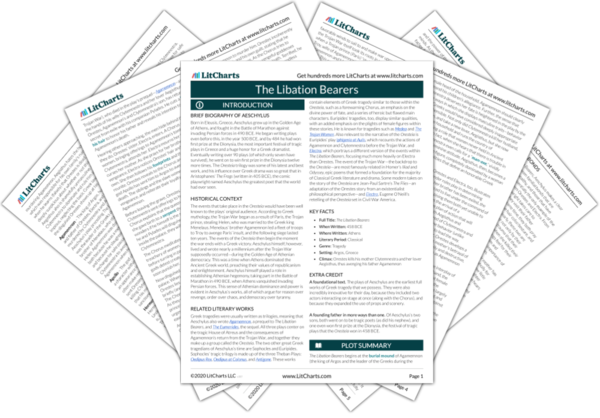Revenge
As is also true of its “prequel” Agamemnon, The Libation Bearers centers on a series of acts of revenge. Having returned home from exile, Orestes (along with his sister Electra) is determined to murder his mother Clytemnestra (and her lover Aegisthus) for her role in the murder of his father Agamemnon—a murder that was itself an act of vengeance for Agamemnon’s sacrifice of his and Clytemnestra’s oldest daughter, Iphigenia, in…
read analysis of RevengeGender Roles
The question of gender roles is pivotal to one of the most troubling issues of The Libation Bearers: should Orestes and Electra be loyal to their dead father, or their living mother? For the siblings (and for Ancient Greek audiences of the day), the question was not a difficult one. As the male head of the household, Agamemnon should clearly command his children’s allegiance. Further, the sense that Clytemnestra deserves her fate is heightened…
read analysis of Gender RolesFate, the Gods, and Piety
Although no gods appear within The Libation Bearers, Aeschylus makes clear that ideas of piety and the power of the gods are in the forefront of his characters’ minds. As the play opens, Orestes visits the burial mound of his father Agamemnon and offers a lock of his hair to his father’s spirit and to the gods, especially to Hermes, who guides the dead to the underworld. As the play moves forward, we…
read analysis of Fate, the Gods, and Piety
Familial Bonds
In The Libation Bearers, Aeschylus makes a clear distinction between familial bonds that are wholesome and healthy, and those that have become twisted and deadly. Essentially the only example of the former is the relationship between Orestes and Electra. From the play’s first moments, the playwright takes care to emphasize how alike the two are: they visit their father Agamemnon’s burial mound at the same time, they both pray to the god Hermes…
read analysis of Familial BondsViolence, Death, and the Dead
All of the characters within The Libation Bearers speak a language of violence and death. Whether male or female, they all express sentiments that are incredibly bloody, from Orestes and Electra plotting their mother’s murder, to the Chorus wishing for “the fresh-drawn blood of Justice,” to Aegisthus contemplating Orestes’s (falsely reported) death, to Clytemnestra calling for a “man-axe” to defend her house. Within this world, in which fathers kill children, wives kill husbands…
read analysis of Violence, Death, and the Dead











